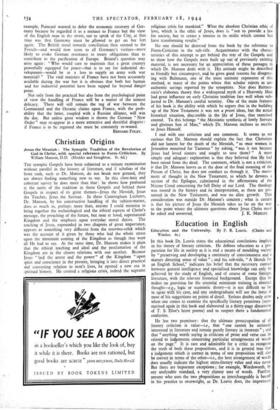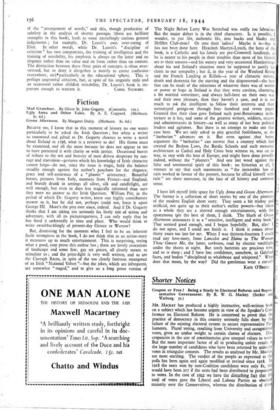Education in English
IN this book Dr. Leavis states the educational conclusions implici in his theory of literary criticism. He defines education as a pre- paration for life in society as it is and a means of moulding socien by "preserving and developing a continuity of consciousness and 3 mature directing sense of value " ; and his sub-title, "A Sketch for an English School," indicates his belief that the necessary contac between general intelligence and specialised knowledge can only b achieved by the study of English, and of course of some foreign literature, with the relevant historical background. Except that h makes, no provision for the essential minimum training in abstrac thought—e.g., logic or economic theory—it is not difficult so fa to agree with his case, and any undergraduate will the force 0 most of his suggestions on points of detail. Serious doubts only arise when one comes to examine the specifically literary premisses (sum marised again in this book and elaborated in a thirty-page discussio of T. S.- Eliot's latest poems) and to suspect there a fundamenta confusion.
He has two premisses : that the ultimate preoccupation of al literary criticism is value—i.e., that "one cannot be seriousl interested in literature and remain purely literary in interests " ; an that "anything worth saying in criticism of prose and verse can b related to judgements concerning particular arrangements of word on the page." It is rare and admirable for a critic to recogni the truth of both these propositions, and it is in general true that a judgement which is correct in terms of one proposition will als be correct in terms of the other--i.e., the best arrangement of word does usually indicate the highest extra-literary value and vice versa But there are important exceptions ; for example, Wordsworth, b1 any analysable standard, a very clumsy user of words. Further, anyone who uses the two piopositions as interchangeable is boun in his practice to overweight, as Dr. Leavis does, the importanc
s
of the "arrangement of words," and this, though productive of subtlety in the analysis of shorter passages (there are brilliant examples in this book), leads to some exceedingly curious general judgements ; for example, Dr. Leavis's own over-rating of Eliot. In other words, while Dr. Leavis's "discipline of criticism" has two components, the training of intelligence and, the training of sensibility, his emphasis is always on the latter and on elegance rather than on value and on form rather than on content. The distinction between these three pairs of concepts is often over- stressed, but to deny it altogether is merely to create confusion • everywhere, and particularly in the educational sphere. This is perhaps ungrateful criticism, but, in spite of his ungainly style and an occasional rather childish irritability, Dr. Leavis's book is im-



























 Previous page
Previous page